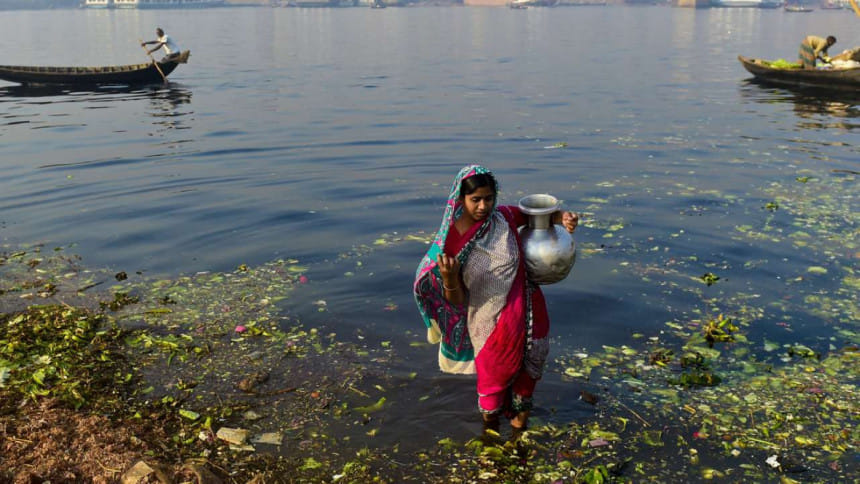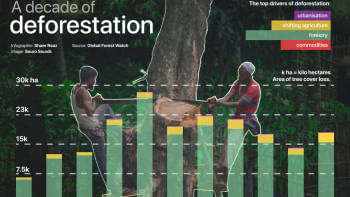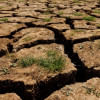The environment is in peril. Act now.

We recently travelled to a couple of villages in Satkhira and Patuakhali, and stayed there for a few days during a heatwave. The electricity frequently went out, leaving us without fans or air conditioning. The stillness of the air made it unbearable, and almost everyone became tired and sick. Women, who cook and take care of families, and those who were out for work—rickshaw pullers, farmers, people with disabilities, and the elderly—suffered the most.
In Satkhira and Patuakhali, drinking water is a significant challenge due to its high salt content. The declining water table has rendered normal tube wells ineffective, leaving only deep tube wells functional. Consequently, many families are forced to purchase water, which is expensive. Many people cannot consume the necessary amount of water, leading to dehydration and various illnesses such as heat stroke, high blood pressure, and skin diseases. Women and adolescent girls are particularly affected, with their sexual and reproductive health at risk. The situation has also exacerbated gender-based violence. Women and girls spend two to three hours collecting a single bucket of water, often facing sexual abuse and having to drop out of school.
A UNICEF-WHO report from 2023 highlights that globally, 1.8 billion people live in households without water supplies on the premises. In seven out of 10 such households, women and girls aged 15 and older are primarily responsible for water collection, compared to three in 10 households for their male peers. Girls under 15 (seven percent) are also more likely than boys under 15 (four percent) to fetch water. Women and girls typically undertake longer journeys to collect water, losing valuable time for education, work, and leisure, while also risking physical injury and danger.
The situation in coastal areas is deteriorating. Cyclone Remal recently caused heavy rain and storm damage, leading to flooding in many villages due to fragile embankments. The cyclone made a devastating landfall in southern Bangladesh, affecting 3.7 million people and disrupting lives, livelihoods, and education, while worsening living conditions. Many people may be displaced internally, placing a heavy burden on women and girls. Girls often become victims of child marriage, with Bangladesh having one of the highest prevalence rates of child marriage globally—51 percent of children marry before the age of 18, according to the 2019 Multiple Indicator Cluster Survey conducted by the Bangladesh Bureau of Statistics (BBS).
We are experiencing heatwaves, water crises, and air pollution due to environmental degradation. Our environment sustains us, but we are failing to protect it. We use plastics that pollute water and land, chemicals that degrade soil and water, and we build homes and industries by grabbing land and cutting trees, leading to deforestation. The lack of adequate rainfall is causing droughts in many parts of Bangladesh. According to the UN Convention to Combat Desertification, up to 40 percent of the planet's land is degraded, directly affecting half of the world's population. The number and duration of droughts have increased by 29 percent since 2000. Without urgent action, droughts may affect over three-quarters of the world's population by 2050.
We are running out of time. Significant damage has already occurred. We need to take care of our planet, land, water, and environment. Global warming is intensifying. To keep global warming below 1.5 degrees Celsius this century, we must halve annual greenhouse gas emissions by 2030. Without action, exposure to air pollution beyond safe guidelines will increase by 50 percent within the decade, and plastic waste flowing into aquatic ecosystems will nearly triple by 2040. We need to act now.
Every year, the United Nations Environment Programme (UNEP) celebrates World Environment Day. This year, the focus is on Land Restoration, Desertification, and Drought Resilience, with the slogan: "Our Land, Our Future." We are Generation Restoration. Our actions to protect the environment should not be confined to just one day. We must commit to protecting our environment every day of the year, so that we can enjoy a breath of fresh air on this planet.
Hasina Rahman is country director of The International Rescue Committee.
Views expressed in this article are the author's own.
Follow The Daily Star Opinion on Facebook for the latest opinions, commentaries and analyses by experts and professionals. To contribute your article or letter to The Daily Star Opinion, see our guidelines for submission.

 For all latest news, follow The Daily Star's Google News channel.
For all latest news, follow The Daily Star's Google News channel. 










Comments